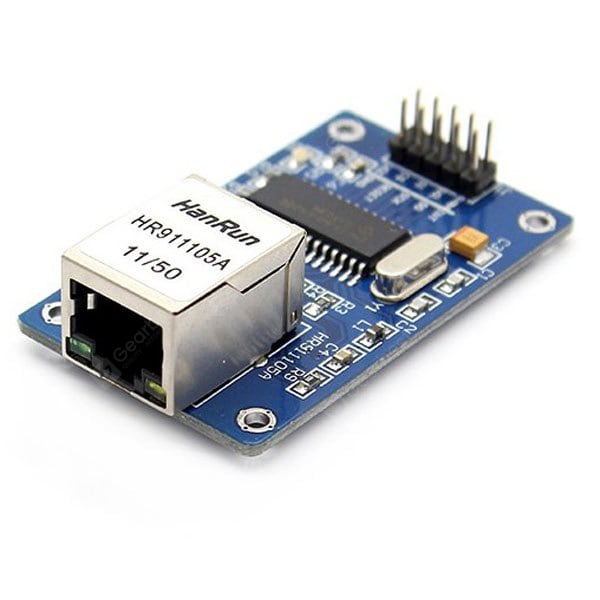Mbed library for ENC28J60 Ethernet modules. Full support for TCP/IP and UDP Server, Client and HTTP server (webserver). DHCP and DNS is included.
Dependents: mBuino_ENC28_MQTT Nucleo_Web_ENC28J60 Nucleo_Web_ENC28J60_ADC Serial_over_Ethernet ... more
Library for ENC28J60 Ethernet modules.

Ported to mbed from Norbert Truchsess's UIPEthernet library for Arduino. Thank you Norbert!
- Full support for persistent (streaming) TCP/IP and UDP connections Client and Server each, ARP, ICMP, DHCP and DNS.
- Works with both Mbed OS 2 and Mbed OS 5.
Usage:
- Import the library into your project.
- Add
#include "UipEthernet.h"tomain.cpp - Create one instance of the UipEthernet class initialized with the MAC address you'd like to use and SPI pins of the connected Mbed board.
Example programs:
Import programWebSwitch_ENC28J60
HTTP Server serving a simple webpage which enables to remotely turn a digital output on/off. Compile, download, run and type 'IP_address/secret/' (don't forget the last '/') into your web browser and hit ENTER.
Import programHTTPServer_Echo_ENC28J60
A simple HTTP server echoing received requests. Ethernet connection is over an ENC28J60 board. Usage: Type the server's IP address into you web browser and hit <ENTER>.
Import programTcpServer_ENC28J60
Simple TCP/IP Server using the UIPEthernet library for ENC28J60 Ethernet boards.
Import programTcpClient_ENC28J60
Simple TCP/IP Client using the UIPEthernet library for ENC28J60 Ethernet boards.
Import programUdpServer_ENC28J60
Simple UDP Server using the UIPEthernet library for ENC28J60 Ethernet boards.
Import programUdpClient_ENC28J60
Simple UDP Client using the UIPEthernet library for ENC28J60 Ethernet boards.
Import programMQTT_Hello_ENC28J60
MQTT Client example program. Ethernet connection is via an ENC28J60 module.
Diff: UdpSocket.h
- Revision:
- 9:a156d3de5647
- Child:
- 11:647d53d146f1
--- /dev/null Thu Jan 01 00:00:00 1970 +0000
+++ b/UdpSocket.h Tue Aug 27 15:01:10 2019 +0000
@@ -0,0 +1,108 @@
+/*
+ UIPUdp.h - Arduino implementation of a UIP wrapper class.
+ Copyright (c) 2013 Norbert Truchsess <norbert.truchsess@t-online.de>
+ All rights reserved.
+
+ Modified (ported to mbed) by Zoltan Hudak <hudakz@inbox.com>
+
+ This program is free software: you can redistribute it and/or modify
+ it under the terms of the GNU General Public License as published by
+ the Free Software Foundation, either version 3 of the License, or
+ (at your option) any later version.
+
+ This program is distributed in the hope that it will be useful,
+ but WITHOUT ANY WARRANTY; without even the implied warranty of
+ MERCHANTABILITY or FITNESS FOR A PARTICULAR PURPOSE. See the
+ GNU General Public License for more details.
+
+ You should have received a copy of the GNU General Public License
+ along with this program. If not, see <http://www.gnu.org/licenses/>.
+ */
+#ifndef UIPUDP_H
+#define UIPUDP_H
+
+#include "mbed.h"
+#include "utility/Udp.h"
+#include "IpAddress.h"
+#include "utility/MemPool.h"
+extern "C"
+{
+#include "utility/uip.h"
+}
+#define UIP_UDP_MAXDATALEN 1500
+#define UIP_UDP_PHYH_LEN UIP_LLH_LEN + UIP_IPUDPH_LEN
+#define UIP_UDP_MAXPACKETSIZE UIP_UDP_MAXDATALEN + UIP_UDP_PHYH_LEN
+
+typedef struct
+{
+ memaddress out_pos;
+ memhandle packet_next;
+ memhandle packet_in;
+ memhandle packet_out;
+ bool send;
+} uip_udp_userdata_t;
+
+class UdpSocket : public Udp
+{
+private:
+ struct uip_udp_conn* _uip_udp_conn;
+ uip_udp_userdata_t appdata;
+public:
+ UdpSocket(); // Constructor
+ virtual ~UdpSocket() { } // Virtual destructor
+ uint8_t begin(uint16_t); // initialize, start listening on specified port. Returns 1 if successful, 0 if there are no sockets available to use
+ void stop(); // Finish with the UDP socket
+ // Sending UDP packets
+ // Start building up a packet to send to the remote host specific in ip and port
+ // Returns 1 if successful, 0 if there was a problem with the supplied IP address or port
+ int beginPacket(IpAddress ip, uint16_t port);
+
+ // Start building up a packet to send to the remote host specific in host and port
+ // Returns 1 if successful, 0 if there was a problem resolving the hostname or port
+ int beginPacket(const char* host, uint16_t port);
+
+ // Finish off this packet and send it
+ // Returns 1 if the packet was sent successfully, 0 if there was an error
+ int endPacket();
+
+ // Write a single byte into the packet
+ size_t write(uint8_t);
+
+ // Write size bytes from buffer into the packet
+ size_t write(const uint8_t* buffer, size_t size);
+
+ // using Print::write;
+ // Start processing the next available incoming packet
+ // Returns the size of the packet in bytes, or 0 if no packets are available
+ int parsePacket();
+
+ // Number of bytes remaining in the current packet
+ int available();
+
+ // Read a single byte from the current packet
+ int read();
+
+ // Read up to len bytes from the current packet and place them into buffer
+ // Returns the number of bytes read, or 0 if none are available
+ int read(unsigned char* buffer, size_t len);
+ // Read up to len characters from the current packet and place them into buffer
+
+ // Returns the number of characters read, or 0 if none are available
+ int read(char* buffer, size_t len) { return read((unsigned char*)buffer, len); }
+
+ // Return the next byte from the current packet without moving on to the next byte
+ int peek();
+ void flush(); // Finish reading the current packet
+
+ // Return the IP address of the host who sent the current incoming packet
+ IpAddress remoteIP();
+
+ // Return the port of the host who sent the current incoming packet
+ uint16_t remotePort();
+private:
+ friend void uipudp_appcall();
+
+ friend class UipEthernet;
+ static void _send(uip_udp_userdata_t* data);
+};
+#endif
